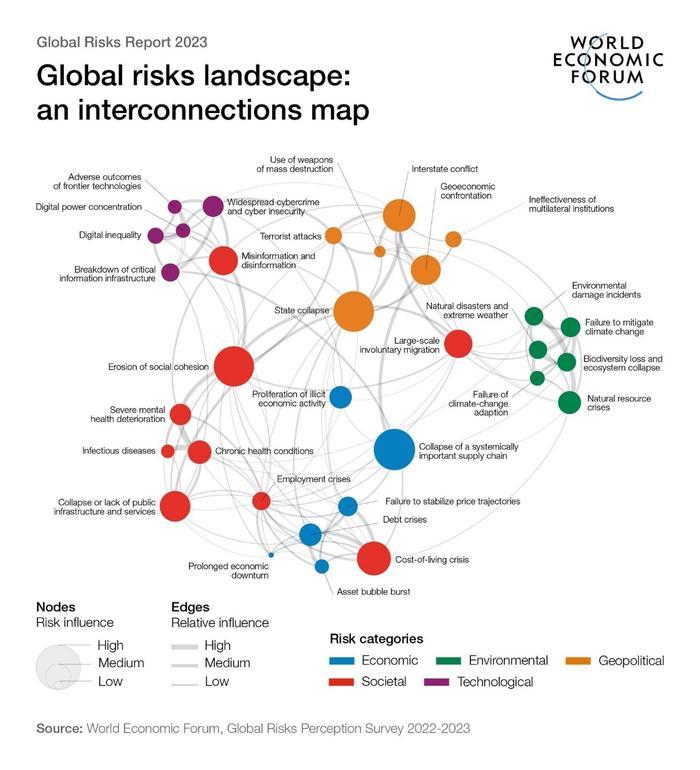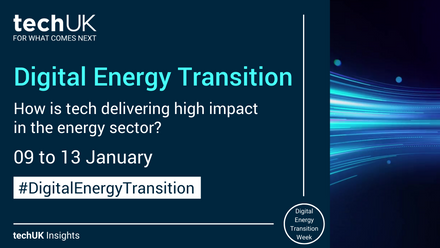WEF Global Risk Report 2023: What does it mean for Tech?
On 11 January, the WEF published its Global Risks Report for the new year, describing a “polycrisis” facing the world, in which risks are highly interdependent and exacerbate each other. The report called for integrated and immediate mitigation to address these crises and warns of the dangers of low investment in resilience.
The report also offers some action pathways to address the “polycrisis” it outlines, including a Fourth Industrial Revolution driven by technology, an energy transition and leveraging the health sector.
The report is divided up into 8 sections, including the following:
- Energy Transition,
- The crisis in the global energy system, catalysed by the events of 2022, has brought forward the need for immediate action to diversify the energy mixture and the revolutionise the delivery mechanisms of power. The report mentions the three dimensions of energy being sustainability, security, and affordability. Balancing these dimensions is argued to be key to achieving net zero by 2050 but relies on rapid clean power deployment, investment in energy efficiency and the deployment of CO2 removal tech.
- 4th Industrial Revolution Technology,
- The technologies characteristic of a Fourth Industrial Revolution is slated to be Green Tech, Adaptive AI, and Quantum Computing. The WEF argues that the harnessing of these technologies and the data associated with their use will be critical for national security and sovereignty. The report also stresses the importance of interoperability and data flows across borders and between companies to achieve sustainability targets. Finally, investment in digital trust is cited as a key consideration for this renewed digital economy.
- Climate action,
- The WEF starts by recognising the key near term risk, the cost-of-living crisis, and linked this to the looming energy and food crises which climate change underpins. Public-private collaboration and policy are said to be key to scale innovation in the fight against climate change. Collaboration along value chains and with governments will be critical to private sector leadership on climate change.
- Overcoming mineral resource scarcity,
- Minerals are recognised as increasingly critical for the clean energy transition but there is concern over the supply and demand relationship when it comes to Critical Raw Minerals (CRMs) which may present new risks linked to scarcity. This WEF report confirms that demand is unlikely to be met and may result in environmental pressure on ecosystems, clean tech adoption faltering and reduced standards on responsible mining. Collaboration, leadership and CSOs are likely to be key to mitigate the worsts of the risks associated with CRMs.
- Circular economy innovation,
- This report cites resource circularity as a key enabler for tackling the current triple planetary crises on climate, biodiversity, and pollution, while also providing economic growth and stability. Ecological design of manufactured products, ensuring that all materials are circular in nature, would minimise harm to the planet. This is suggested to help to address the scarcity of CRMs noted elsewhere in the report. This will require companies and governments to adopt circular operating and business models, a complete paradigm shift. This work has begun in many companies already. To do so is said to increase the resilience of industries, reduce resource pressure and drastically reduce waste from current operating models.
The full risk map from WEF Global Risks Report 2023 can be found below.

To find out more about any of the topic areas discussed in this report, please get in touch with the team at techUK:

Craig Melson
Craig is Associate Director for Climate, Environment and Sustainability and leads on our work in these areas ranging from climate change, ESG disclosures and due diligence, through to circular economy, business and human rights, conflict minerals and post-Brexit regulation.

Josh Turpin
Josh joined techUK as a Programme Manager for Telecoms and Net Zero in August 2024.

Lucas Banach
Lucas Banach is Programme Assistant at techUK, he works on a range of programmes including Data Centres; Climate, Environment & Sustainability; Market Access and Smart Infrastructure and Systems.







